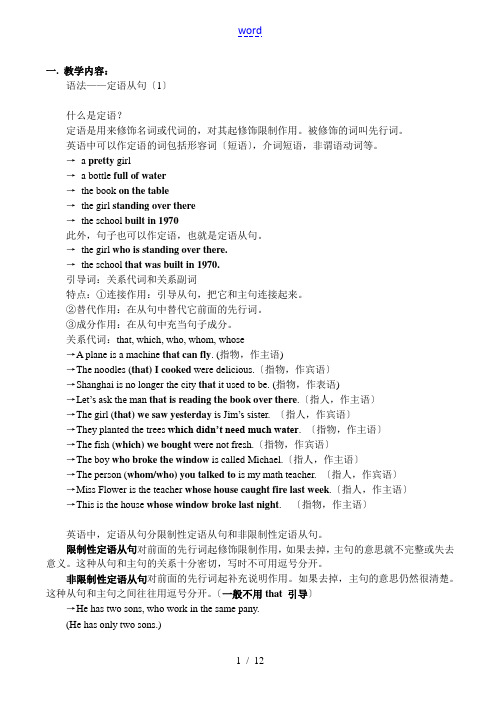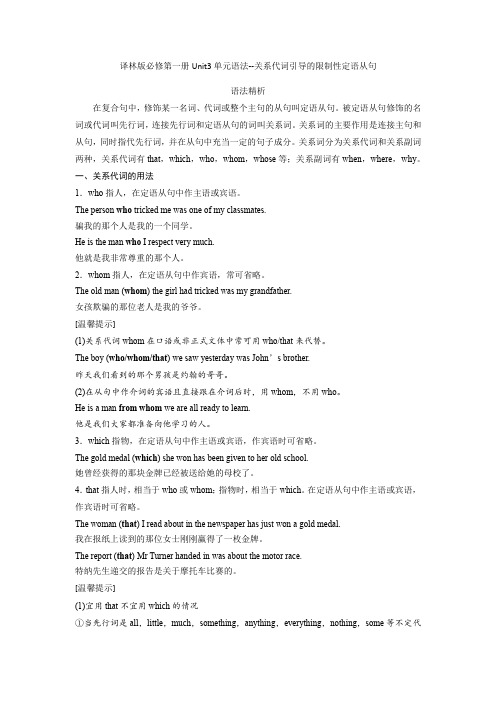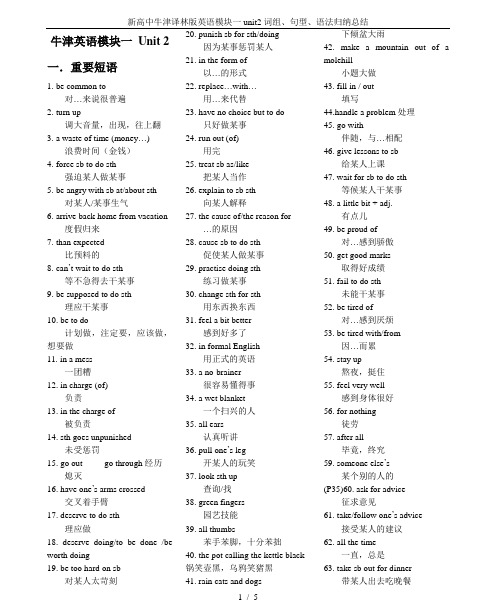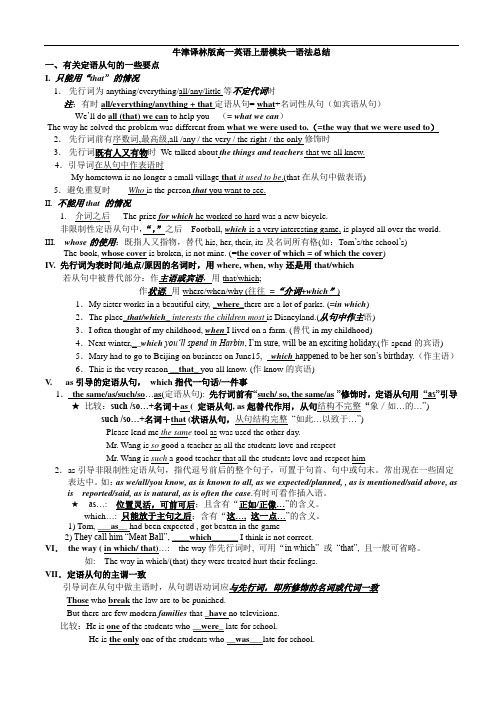(完整版)高一英语(牛津译林版)定语从句
高中英语必修一语法讲解 定语从句(1)

,定语从句(1)概念引入:She is the girl who sings best of all.她是所有人中唱得最好的。
This is the best film that I have ever seen.这部电影是我看过的最好的一部。
He had failed in the maths exam, which made his father very angry .他数学考试没有及格,这使他的父亲很生气。
Give me the b ook whose cover is green.把那本儿绿皮儿的书给我。
定语从句是我们初中学过的一项语法,上面这些句子与你初中学的有差别吗?是不是有点不同呢?从这个单元开始,我们将学习定语从句的升级版,但还是从头开始学哟。
语法点拨【高清课堂:定语从句一 P1】定语从句的定义 Do you know the girl who came here yesterday? 你认识昨天来的那个女孩吗?The book which he bought the day before yesterday is very good .他前天买的那本书很棒。
He is the man whom we should learn from . 他就是我们应该学习的人。
Her friend whose home is very far came to see her . 她的那位家很远的朋友来看她了。
其中粗体的部分就是定语从句,划横线的部分叫做先行词,也就是被定语从句修饰的词。
定语从句:修饰一个名词或代词的从句称为定语从句,一般紧跟在它所修饰的先行词后 面。
先行词:被定语从句修饰的名词或代词。
关系词:上面例子中的关系代词 who, whom, which, that 是用来引导定语从句的连接词。
这些连接词代替先行词在从句中担任一个成分,如主语、宾语或表语。
例如:Those students who study in this school are good at football.(who 代替先行词 students 在从句中充当主语)There is still mu ch homework which we must finish.(which 代替先行词 homework 在从句中充当宾语)关系代词引导的定语从句I. who 和 whom1. who 和 whom 代表人, 当先行词在从句中作主语时用 who 引导,作宾语时用 whom 引导。
(完整版)定语从句(完整版)

定语从句定语从句及相关术语1. 定语从句:定语从句是由关系代词或关系副词引导的从句,其作用是作定语修饰主句的某个名词性成分,相当于形容词,所以又称为形容词性从句,一般紧跟在它所修饰的先行词后面。
2. 关系词:引导定语从句的关联词称为关系词,关系词有关系代词和关系副词。
关系代词有that, whi ch, who, whom, whose, as等;关系副词有where, when, why等。
关系词常有3个作用:1,引导定语从句。
2,代替先行词。
3 ,在定语从句中担当一个成分。
注:关系代词有主语.宾语之分。
一般whom作为宾语。
4. 定语:定语用来限定、修饰名词或代词的,是对名词或代词起修饰、限定作用的词、短语或句子,汉语中常用’••…的'表示。
主要由形容词担任。
此外,名词,代词,数词,分词,副词,不定式以及介词短语也可以来担任,也可以由一个句子来担任.单词作定语时通常放在它所修饰的词之前,作前置定语。
短语和从句作定语时则放在所修饰的词之后,作后置定语。
先行词:被定语从句修饰的名词、代词称为先行词。
(一)限定性定语从句一、关系代词(在句中作主语、宾语或定语)1. that既可代表事物也可代表人,which代表事物;它们在从句中作主语或宾语,that在从句中作宾语时常可省略关系词,which在从句中作宾语也可以省略。
[eg : this is the book (which ) you want。
]而且,如果which在从句中作不及物动词+介词”的介词的宾语,注意介词不要丢掉,而且介词总是放在关系代词which的前边,但有的则放在它原来的位置2. which作宾语时,根据先行词与定语从句之间的语义关系,先行词与which之间的介词不能丢3. 代表物时多用which,但在带有下列词的句子中用that而不用which,这些词包括当先行词是anyt hing, everything, nothing , none 等不定代词时,或者是由every, any, all, some, no, little, few, muc h等修饰时等,这时的that 常被省略还有先行词前有序数词或形容词最高级修饰时,或先行词就是序数词或最高级时.以及先行词中既有人又有物时.还有句中前面有which时,都只能用that4. who和whom引导的从句用来修饰人,分别作从句中的主语和宾语,whom作宾语时,要注意它可以作动词的宾语也可以作介词的宾语5. whose是关系代词,修饰名词作定语,相当于所修饰成分的前置所有格.它引导的从句可以修饰人和物,当它引导的从句修饰物体时,可以与of which调换,表达的意思一样。
高一英语语法——定语从句(1) 教案

一. 教学内容:语法——定语从句〔1〕什么是定语?定语是用来修饰名词或代词的,对其起修饰限制作用。
被修饰的词叫先行词。
英语中可以作定语的词包括形容词〔短语〕,介词短语,非谓语动词等。
→ a pretty girl→ a bottle full of water→the book on the table→the girl standing over there→the school built in 1970此外,句子也可以作定语,也就是定语从句。
→the girl who is standing over there.→the school that was built in 1970.引导词:关系代词和关系副词特点:①连接作用:引导从句,把它和主句连接起来。
②替代作用:在从句中替代它前面的先行词。
③成分作用:在从句中充当句子成分。
关系代词:that, which, who, whom, whose→A plane is a machine that can fly. (指物,作主语)→The noodles (that) I cooked were delicious.〔指物,作宾语〕→Shanghai is no longer the city that it used to be. (指物,作表语)→Let’s ask the man that is reading the book over there.〔指人,作主语〕→The girl (that) we saw yesterday is Jim’s sister. 〔指人,作宾语〕→They planted the trees which didn’t need much water. 〔指物,作主语〕→The fish (which) we bought were not fresh.〔指物,作宾语〕→The boy who broke the window is called Michael.〔指人,作主语〕→The person (whom/who) you talked to is my math teacher. 〔指人,作宾语〕→Miss Flower is the teacher whose house caught fire last week.〔指人,作主语〕→This is the house whose window broke last night. 〔指物,作主语〕英语中,定语从句分限制性定语从句和非限制性定语从句。
Unit 3 Grammar 讲义-高一英语牛津译林版(2020)必修第一册

译林版必修第一册Unit3单元语法--关系代词引导的限制性定语从句语法精析在复合句中,修饰某一名词、代词或整个主句的从句叫定语从句。
被定语从句修饰的名词或代词叫先行词,连接先行词和定语从句的词叫关系词。
关系词的主要作用是连接主句和从句,同时指代先行词,并在从句中充当一定的句子成分。
关系词分为关系代词和关系副词两种,关系代词有that,which,who,whom,whose等;关系副词有when,where,why。
一、关系代词的用法1.who指人,在定语从句中作主语或宾语。
The person who tricked me was one of my classmates.骗我的那个人是我的一个同学。
He is the man who I respect very much.他就是我非常尊重的那个人。
2.whom指人,在定语从句中作宾语,常可省略。
The old man (whom) the girl had tricked was my grandfather.女孩欺骗的那位老人是我的爷爷。
[温馨提示](1)关系代词whom在口语或非正式文体中常可用who/that来代替。
The boy (who/whom/that) we saw yesterday was John’s brother.昨天我们看到的那个男孩是约翰的哥哥。
(2)在从句中作介词的宾语且直接跟在介词后时,用whom,不用who。
He is a man from whom we are all ready to learn.他是我们大家都准备向他学习的人。
3.which指物,在定语从句中作主语或宾语,作宾语时可省略。
The gold medal (which) she won has been given to her old school.她曾经获得的那块金牌已经被送给她的母校了。
4.that指人时,相当于who或whom;指物时,相当于which。
新高中牛津译林版英语模块一unit2词组、句型、语法归纳总结

牛津英语模块一Unit 2 一.重要短语1. be common to对…来说很普遍2. turn up调大音量,出现,往上翻3. a waste of time (money…)浪费时间(金钱)4. force sb to do sth强迫某人做某事5. be angry with sb at/about sth对某人/某事生气6. arrive back home from vacation度假归来7. than expected比预料的8. can’t wait to do sth等不急得去干某事9. be supposed to do sth理应干某事10. be to do计划做,注定要,应该做,想要做11. in a mess一团糟12. in charge (of)负责13. in the charge of被负责14. sth goes unpunished未受惩罚15. go out go through经历熄灭16. have one’s arms crossed交叉着手臂17. deserve to do sth理应做18. deserve doing/to be done /be worth doing19. be too hard on sb对某人太苛刻20. punish sb for sth/doing因为某事惩罚某人21. in the form of以…的形式22. replace…with…用…来代替23. have no choice but to do只好做某事24. run out (of)用完25. treat sb as/like把某人当作26. explain to sb sth向某人解释27. the cause of/the reason for…的原因28. cause sb to do sth促使某人做某事29. practise doing sth练习做某事30. change sth for sth用东西换东西31. feel a bit better感到好多了32. in formal English用正式的英语33. a no-brainer很容易懂得事34. a wet blanket一个扫兴的人35. all ears认真听讲36. pull one’s leg开某人的玩笑37. look sth up查询/找38. green fingers园艺技能39. all thumbs苯手苯脚,十分苯拙40. the pot calling the kettle black锅笑壶黑,乌鸦笑猪黑41. rain cats and dogs下倾盆大雨42. make a mountain out of amolehill小题大做43. fill in / out填写44.handle a problem处理45. go with伴随,与…相配46. give lessons to sb给某人上课47. wait for sb to do sth等候某人干某事48. a little bit + adj.有点儿49. be proud of对…感到骄傲50. get good marks取得好成绩51. fail to do sth未能干某事52. be tired of对…感到厌烦53. be tired with/from因…而累54. stay up熬夜,挺住55. feel very well感到身体很好56. for nothing徒劳57. after all毕竟,终究59. someone else’s某个别的人的(P35)60. ask for advice征求意见61. take/follow one’s advice接受某人的建议62. all the time一直,总是63. take sb out for dinner带某人出去吃晚餐64. be meant to do被打算用来做某事65. keep sth in mind把…记在心里66. What’s up ?什么事呀?67. tidy up使整齐68. keep sth looking tidy使某物看上去整洁69. clean up清理,整理70. make a bit of difference有点与众不同71. either … or …要么…要么…72.find fault of sb 找—-的缺点It’s one’s fault 这是某人的错73. fix one’s problem解决某人的问题(p38)74. be/become upset with 对…感到生气75. early on早些时候76.defend …against/from ..保护--免遭—defend one’s deed—Guard the farm from being attacked警严以防卫,protect our eyes from sunlight77. as if/though好象78. insist on/upon n/doing sth insister that …(should)…坚持做Stick to 名词,坚持坚守原则计划任务stick to our task79. waste some time doing sth浪费时间做某事80. in/at Internet cafes在网吧81. every time/each time/next time 引导时间状语从句82. at present目前,现在83. prevent sb (from) doing阻止某人做某事84. do harm to=be harmful to对…有害(危害抽象事物)injure 事故中/wound武器伤hurt肉体、情感85. suggest doing sth建议做某事86. like crazy疯狂地87. now that 既然88. play foreign music演奏外国音乐89. send/put sb to bed打发某人去睡觉90. forbid sb from doing阻止某人做某事91. solve the problem解决问题92. bridge the generation gap缩小代沟93. get along better相处的更好94. work on演算,从事95. work out解出,结果是96. make a draft打个草稿97. make a final version作出最后的样本98. be included in…被包含在99.tend to do 趋向于做100.fit in society 融入社会101.leave out 省略,遗漏leave…alone 不管/leave…behind留下,忘带Leave over剩下102.a piece of cake 小菜一碟103.have difficulty/trouble doing104.mix up 混合105 Set a limit to 限制limit…to….把---限制在-106.go back/return to normal 恢复正常above/below normal107.along with108.tolerate doingtolerate sb doing109.have his arms crossed 双臂交叉110.bend down/over, 弯腰bend…to 使---屈从于--bend one’s attention专心于be bent on 专心于frighten sb into doing 吓得—做某事frighten sb away/off 吓跑error / mistake / fault通常指人的过失,过错find fault withbe upset about /that从句upset the balance 打破平衡normal正常的,常规的ordinary平凡的,普通的,和common基本一样usual 通常的,习惯的unusual 。
牛津译林版高一英语上册必修一 语法总结

牛津译林版高一英语上册模块一语法总结一、有关定语从句的一些要点I. 只能用“that”的情况1.先行词为anything/everything/all/any/little等不定代词时注:有时all/everything/anything + that定语从句= what+名词性从句(如宾语从句)We’ll do all (that) we can to help you (= what we can)The way he solved the problem was different from what we were used to.(=the way that we were used to)2.先行词前有序数词,最高级,all /any / the very / the right / the only修饰时3.先行词既有人又有物时We talked about the things and teachers that we all knew.4.引导词在从句中作表语时My hometown is no longer a small village that it used to be.(that在从句中做表语)5.避免重复时Who is the person that you want to see.II. 不能用that 的情况1.介词之后The prize for which he worked so hard was a new bicycle.非限制性定语从句中,“,”之后Football,which is a very interesting game, is played all over the world. III. whose的使用:既指人又指物,替代his, her, their, its及名词所有格(如:Tom’s/the school’s) The book, whose cover is broken, is not mine. (=the cover of which = of which the cover)IV. 先行词为表时间/地点/原因的名词时,用where, when, why还是用that/which若从句中被替代部分:作主语或宾语,用that/which;作状语, 用where/when/why (往往=“介词+which”)1.My sister works in a beautiful city, _where_there are a lot of parks. (=in which)2.The place_that/which_ interests the children most is Disneyland.(从句中作主语)3.I often thought of my childhood, when I lived on a farm. (替代in my childhood)4.Next winter,__which you’ll spend in Harbin, I’m sure, will be an exciting holiday.(作spend的宾语)5.Mary had to go to Beijing on business on June15, which h appened to be her son’s birthday.(作主语)6.This is the very reason __that_ you all know. (作know的宾语)V. as引导的定语从句,which指代一句话/一件事1.the same/as/such/so…as(定语从句):先行词前有“such/ so, the same/as ”修饰时,定语从句用“as”引导★比较:such /so…+名词+as ( 定语从句, as起替代作用,从句结构不完整“象/如…的…”) such /so…+名词+that (状语从句,从句结构完整“如此…以致于…”)Please lend me the same tool as was used the other day.Mr. Wang is so good a teacher as all the students love and respectMr. Wang is such a good teacher that all the students love and respect him 2.as引导非限制性定语从句,指代逗号前后的整个句子,可置于句首、句中或句末。
[2021精选]译林牛津版高中英语必修一学案:定语从句
![[2021精选]译林牛津版高中英语必修一学案:定语从句](https://img.taocdn.com/s3/m/ba3312cf58fb770bf68a556d.png)
徐开高高一英语定语从句〔2021.9.18〕命题人高一英语组一、根本概念定语从句:在复合句中作定语,修饰名词或代词的从句叫定语从句。
先行词:被定语从句所修饰的名词或代词。
一般情况下,定语从句紧跟先行词。
但也有因各种原因定语从句与先行词被分割的现象。
关系代词:定语从句的引导词,紧跟先行词,并在定语从句中充当一个成分。
关系代词:who,whom,which,that和whose,关系代词在定语从句中充当主语、宾语、表语和定语。
二、关系代词的用法(一)根本用法根据先行词的不同,和在从句中所充当的成分不同,选用不同的关系代词。
注意:关系代词在定语从句中充当宾语时可以省略,充当主语时那么不能。
一、用适当的关系代词填空__________1.This is the hero __________ we are pound of.这是我引以为荣的那个英雄。
______________________________2.This is the pen __________ I wrote the letter with. 这是我写信时用的钢笔。
__________3.Do you know the professor ________will five us a speech next week?4.I read a report about his new novel________will soon be published.5.The plan_______they argued about was settled at last.6.Rice is a plant________is grown in the south.7.China is a country_________has a long history.8.The cup _________is on the desk belongs to Tom.9.Yesterday I saw a beautiful dress_______you may like in that store.10.The man_________you saw in the library is called Smith.11.The woman________gave a speech on TV yesterday is our English teacher.12.This is the man________I mat in the park.二、改错1.Is this museum you visited a few days ago?2.The girl which is standing next to our teacher is her daughter.3.The cake you made it yesterday was very delicious.4.Do you know the man wrote the letter?5.The book you borrowed it from me is Tom’s.6.The house is built on soft land is easy to fall down.三、用定语从句合并以下句子1.This is the new secretary. I would introduce her to you.____________________________________________________________________________2.The train was late. It was going to Shanghai.____________________________________________________________________________ 3.The school is a big one. The school stands near the river._____________________________________________________________________________ 4.I will never forget the days. We spent the days together._____________________________________________________________________________ 5.My uncle bought the bike last week. The bike has been stolen._____________________________________________________________________________ 四、完成句子1.Wheat is a plant____________________________________.〔中国北方种植的〕2.This is the gentleman___________________________________.(眼睛失明的)3.He is not the man_________________________________.〔原来的他〕4.The girl ________________________________(正在会上发言的) is our monitor.5.Is this the book___________________________(你想要的)?6.He is the man____________________________(我正在找的人).7.The letter_________________________________(我昨天收到的)was from my aunt. 〔二〕只用关系代词that的情况1.先行词是最高级形容词或它的前面有最高级形容词修饰时。
Unit 4 Grammar 讲义-2021-2022学年高一英语牛津译林版(2020)必修第一册

译林版必修第一册Unit4单元语法--关系副词引导的限制性定语从句语法精析当先行词在定语从句中作状语时,通常要用关系副词引导定语从句。
常用的关系副词有where,when,why等。
1.关系副词wherewhere引导的定语从句的先行词往往是表示地点的名词(如place,room,house,spot等),关系副词在从句中作地点状语。
常用in which,at which,on which等代替。
They are playing in the park where(=in which) there are some flowers.他们正在有花的公园里玩耍。
The office where(=at which) the girl works is not far from here.这个女孩工作的办公室离这儿不远。
[温馨提示]①有一些先行词,如point,stage,position,case,condition等,属于抽象的地点名词,如果定语从句中缺状语,需要接where引导的定语从句。
You reach a point in your project where you just want to get the thing f inished.从事任何项目你都会进入一种境界:一心想完成它。
We reached a stage where we had to answer violence with violence.我们陷入了必须用暴力来对抗暴力的境地。
②where引导定语从句和状语从句的区别:引导定语从句时,where是关系副词,在从句中作地点状语,其前有表示地点的名词作先行词,从句修饰先行词;引导状语从句时,where是从属连词,从句修饰主句的谓语动词,where前面没有表示地点的名词。
He’s got into a situation where he is likely to lose control over the plane.(定语从句)他陷入了一种很可能会失去对飞机的控制的境地。
- 1、下载文档前请自行甄别文档内容的完整性,平台不提供额外的编辑、内容补充、找答案等附加服务。
- 2、"仅部分预览"的文档,不可在线预览部分如存在完整性等问题,可反馈申请退款(可完整预览的文档不适用该条件!)。
- 3、如文档侵犯您的权益,请联系客服反馈,我们会尽快为您处理(人工客服工作时间:9:00-18:30)。
定语从句一、基本概念1.定语从句:在一个主从复合句中修饰某一个名词、代词或修饰整个主句的从句叫定语从句。
换句话说,定语从句就是用来作定语的句子。
2.先行词:被定语从句修饰的名词或代词叫先行词。
先行词前一般用the ,但在指“一个”概念时可用a , an 。
3.关系代词/ 关系副词:连接先行词和定语从句的词叫关系词,根据其在从句中作用分为关系代词或关系副词。
若先行词在从句中作主语、宾语和定语等,应用关系代词引导定语从句;若先行词在从句中作时间状语、地点状语和原因状语等,应用关系副词引导定语从句。
4.定语从句的位置:一般紧跟在先行词后面。
但有时因句子结构的需要,定语从句和先行词被某些成分隔开。
5.引导定语从句的关系词分为二类:关系代词:that, which ,who, whom ,whose , as 关系副词:when, where, why二、基本用法2.使用关系代词时应注意的几个问题:a. 在以下几种情况下只使用that不用which。
1.先行词是不定代词时,如: all, anything, everything, nothing, something, little, few, much。
1.I told him all (that) I know.2.He gave her everything (that) he had.2.先行词被all, every, any, the very, the only, the just等修饰时。
1.I have read all the books (that) you gave me.2.You can take any book (that) you like.3.先行词被序数词和形容词的最高级修饰时。
1. This is the best book (that) I have ever read.2. The second place (that) I want to visit is Shanghai.4.先行词既有人又有物时。
1.We talked about the persons and things (that) we remember in the school.2.The people and the animals that were killed in the earthquake have all been found. 5.在Who, Which引起的疑问句中。
1. Who is the boy that helped you?2. Which is the book (that) you bought yesterday?6. 若有两个定语从句,一个用which引导,另一个须用that引导。
He bought a book which could give him knowledge and that could help to kill the time.7. 当先行词在定语从句中作表语时。
Mary is no longer the girl (that) she used to be.b.在以下几种情况下只使用which 不用that。
1. 引导非限制性定语从句时。
I have lost my pen, which I like very much. (which 作宾语,指代主句中的pen)New concept English is intended for foreign students, which is known to all of us.(which作主语,指代整个主句)2. 若有两个定语从句,其中一个关系代词是which,另一个须用that。
The book (that) he bought yesterday was the one (which) he liked best.3. 先行词在句中作介词宾语且介词前置时。
This is the house in which Lu Xun once lived.c.当先行词为指人的关系代词时,引导词只用who 不用that。
1. 先行词为all, anyone, one / ones, those, people 时,须用who。
1. Anyone who knows how to do it can do it now.2. Those who want to see the film please put up your hands.3. He, who does not reach the Great Wall, is not a true man.2. 在非限制性定语从句中,须用who。
Tom’s father, who is over sixty, still works hard.3. 在被分隔的定语从句中,须用who。
A new teacher will come tomorrow who will teach you German.4. 在以there be开头的句子中,多用who。
There is a stranger who wants to see our headmaster.5. 若有两个定语从句,其中一个关系代词是that,另一个须用who。
The student who was praised at the meeting is the monitor that studies very hard.如:As we all know, he studies very hard.比较:He studies very hard, as / which we all know.I’ve never seen such a clever man as he is.He has to work on Sundays, which he doesn’t like.He was late, which made the teacher angry.The bridge is really wonderful, as (is) shown in the picture.The experiment is very important, as indeed it is.e. the same…as …和the same… that…的不同。
This is the same book as I lent you yesterday.这本书和我昨天借给你的相似。
(相似物)This is the same book that I lent you yesterday.这正是我昨天借给你的那本书。
(同一物)【小试牛刀】I.用关系代词who, whom, that, which, whose, as填空。
1. The earthquake ________shook the city in 1906 was the biggest in American history.2. We don’t know the number of people __________lost their homes in the earthquake.3. The house ___________they built in 1937 is still in very good condition.4. The house __________is built on sand may fall down in an earthquake.5. The boy ___________ father is a teacher is very clever.6. A clock is a machine ____________tells people the time.7. Our village is no longer the one __________ it used to be.8.The house __________ he is looking for is very expensive.9. Do you know the man __________ houses are all broken?10. ________ is known to all, the moon travels round the earth once very month.【答案】1. that/ which 2. who/ that 3. that/ which / 不填 4. that/ which 5. whose6. that / which7. that / 不填8. that / which / 不填9. whose 10. AsII.把下面各组句子合并成含有定语从句的复合句。
1. The girl is not here. She is going to sing a song.2. The school is a big one. The school stands near the river.3. The girl works very hard. Her father is a doctor.4. My uncle bought the bike last week. The bike has been stolen. 5.The pen is very old. I lent it to you this morning. III.翻译下面句子1.刚才作演讲的那个教授已经走了。
____________________________________________________________ 2.你认识那个母亲是老师的女孩吗?______________________________________________________________ 3.鸟是一种能飞的动物。
______________________________________________________________ 4.我上周买的那支钢笔很便宜。
______________________________________________________________ 5.门朝北开的那间房子已经被卖了。
______________________________________________________________【答案】1. The professor that / who made the speech just now has left.2. Do you know the girl whose mother is a teacher?3. A bird is an animal which / that can fly.4. The pen (that / which) I bought last week is very cheap.5. The room whose door faces north has been sold.3.关系副词的基本用法:同样是表示地点的先行词,为何有时候用关系代词that, which,有时候用关系副词where?同样是表示时间的先行词,为何有时候用关系代词that, which,有时候用关系副词when?请对比以下几组句子:I have found the factory that / which he visited last week.I have found the factory where he stayed last week.The days that / which I spent there are unforgettable.The days when I stayed there are unforgettable.The reason that / which he told me for his being late is that he got up late.The reason why he was late is that he got up late.说明:当引导词在定语从句中作主语,宾语或表语时,尽管先行词是时间名词,地点名词或表示原因的名词, 我们仍然使用关系代词that, which。
